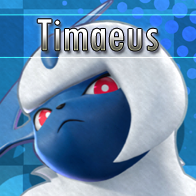Leaderboard
Popular Content
Showing content with the highest reputation on 09/01/2015 in all areas
-

What am I missing?
AngelCityOutlaw and 2 others reacted to Nabeel Ansari for a topic
A different mindset that I take with this that others are going to disagree with: If you don't know how you want to remix something, don't remix it. Trying to force a track where you have no idea what you want it to sound like is not an organic process. Get better at writing and learn how to wield different styles effectively. Make sure you *enjoy* these styles, too. If you know what a style sounds like, you're more likely to be able to hear a certain song and imagine it in that style, and that ability is the foundation for starting your arrangement. In my experience, arrangements that were born out of request or specification (I need to remix [insert name here] tune for project/compo/because I like it) always paled in comparison to arrangements born out of initial ideas ("The Fire Emblem theme from Smash Melee, but cranked to 11, and with orchestral part writing in the bridge!") That's not to say you can't have inspired ideas in projects/compos/picking your favorite tunes; you definitely can, and you should enter compos to exercise that. But even in compos, I've had a few instances where I simply just was unable to think of a clear idea on what to do and was essentially forced to output a grinding of the gears, so to speak. I had to completely revert to mechanical, theoretical understanding without enjoying what I was writing and just do "the melody" and "the other melody" and "making sure the harmony is correct" and "adding cymbal transitions" and then mixing it together. I've also committed to projects and then left after picking a cool source and not actually thinking about how to arrange it. This runs true in many other mediums of creative output as well. A similar sentiment is shared in screenwriting. The top screenwriting books will always tell you that you have a hot concept if you can describe it concisely while capturing the essence of it and differentiating it from what's already out there.3 points -

Mega Man X: The Sigma Fortress Remix Gauntlet 2015
Tuberz McGee and 2 others reacted to DarkeSword for a topic
3 points -

Mega Man X: The Sigma Fortress Remix Gauntlet 2015
timaeus222 and one other reacted to Ivan Hakštok for a topic
Maybe tonight at around 7PM EDT?2 points -

Mega Man X: The Sigma Fortress Remix Gauntlet 2015
Tuberz McGee and one other reacted to DarkeSword for a topic
This is a Mega Man X competition. Elec Man is from Mega Man Classic.2 points -

Streets of Rage Album
Garpocalypse reacted to The Coop for a topic
Huh. I never got an e-mail notification about this thread. Weird. Anyway, I'll be trying to get a demo going this weekend. I've had a bit of work to take care of, but that'll be done and gone Thursday. So hopefully I'll have something by Sunday night/Monday morning.1 point -

Mega Man X: The Sigma Fortress Remix Gauntlet 2015
timaeus222 reacted to Ivan Hakštok for a topic
Happening in around 20-30 minutes, I have some stuff to do so I won't be able to start it exactly at 7PM EDT.1 point -

Mega Man X: The Sigma Fortress Remix Gauntlet 2015
Garpocalypse reacted to KingTiger for a topic
I was thinking more along the lines of chaostisist = Chaotix. Im not really pro-Sega, per se, but I am pro-Sonic1 point -

Mega Man X: The Sigma Fortress Remix Gauntlet 2015
Garpocalypse reacted to WillRock for a topic
so.... listening party soon?1 point -
AHHHHHHHHHHHHHHHHHHHHHHHHHHHHHHHHHHHHHHHHHHHHHHHHHHHHHHH AHHHHHHHHHHHHHHHHHHHHHHHH1 point
-

Sonic 3D Blast: Dimensional Duality
~Faseeh~ reacted to Troyificus for a topic
Forgive me my ignorance but what does a directorial / co-directorial role actually entail? If peeps knew what they might be getting themselves into there might be more interest in helping out1 point -

Mega Man X: The Sigma Fortress Remix Gauntlet 2015
Tuberz McGee reacted to Garpocalypse for a topic
In no way was my remix for this week written as super-liminal messaging for a project album that is recruiting remixers. Right here actually: http://ocremix.org/community/topic/39653-streets-of-rage-album-next-check-in-may-3rd-2015/ C'mon. If anyone assumed such a thing.. How dare they. I mean. Come on! ...Cooooooooooooooome on!1 point -

Tides of Time - New original album from RoeTaKa
Sam Ascher-Weiss reacted to RoeTaKa for a topic
Hey, I just released my newest album today. Something I've been working really hard on over the past month besides a couple of tracks. Almost 4 years ago I released my first proper album called 'Strings of Time' and it was this mixture of orchestra, acoustic and electronic instruments and was quite chilled out, quite emotive. This is somewhat of a sequel album and I'm really proud of it, I feel like it's some of my best production to date and a really unique album as well. Thanks for checking it out and I hope you enjoy it. It is £4 over on Bandcamp: https://alexroe.bandcamp.com/album/tides-of-time Thanks for checking it out and I hope you enjoy it.1 point -

Mega Man X: The Sigma Fortress Remix Gauntlet 2015
Eino Keskitalo reacted to KingTiger for a topic
Source breakdown! (I've had this typed up on my computer waiting for the remixes to be posted ) I focused heavily on using the chords from the gauntlet source, but I also used other melodic/harmonic elements from it and my Maverick’s theme. I used a key that neither source is in (fm). Here’s a full source breakdown by source section: chord patterns in Sigma Palace (using Darke’s YouTube link https://www.youtube.com/watch?v=a3yJ29Uq8q0): 0:12 - 0:25, used in the verses 0:24 - 0:47, used in the chorus/hook 0:47 - 0:58, used in the middle of each verse melodic stuff in Sigma Palace (https://www.youtube.com/watch?v=zyIFODbDK5M): rhythmic strings from 0:10 - 0:12, I used the top notes as the foundation for my baseline in the verses, but I simplified it from two 1/8 notes on each note to a single dotted 1/8 on each note. Also the bass in the bridge, changed to 1/4 notes french horn from 0:23-0:24, this is the synth at the beginning and middle of each chorus strings that repeat from 0:24 - 0:47, I used the top notes as the baseline, again using dotted 1/8s instead of the original timing (which is a rest and then three 1/4 notes) harp from 0:47 - 0:52, should be pretty obvious, it’s the synth that plays at the end of the first 8 bars of each verse descending string patten from 0:55 - 0:58, the synth that plays at the end of each chorus melodic stuff from Crescent Grizzly: melody from 0:03 - 0:06 & 0:22 - 0:25, the synth bit at the end of the first half of each verse the resonant-shifting, same note synth from 0:07 - 0:09, the super fast rap before the last chorus - there’s a synth doing something similar under my rap melody from 0:13 - 0:22, there’s a staccato synth part that occurs throughout each verse that does this; specifically, it’s in the 3rd, 11th, and 27th bars of the 1st verse, and the 3rd and 11th bars of the 2nd verse melody from 0:26 - 0:32, this is a background synth line in the 2nd & 3rd choruses the contrapuntal melody from 0:32 - 0:44, this is the synth line in the 2nd verse, the 3rd set of 8 bars (the “different” part of the verse where I start out rapping “anxiety runs high in this town”) the chordal melody from 0:45 - 0:57, this is actually in the bass under the “different” part of both verses… I cut short the notes that are held longer and doubled the speed of the source1 point -

Final Fantasy III: Resurrection - Wrapping Up (Sign Consent Form!)
Brandon Strader reacted to TeraCMusic for a topic
Thank you!! haha I don't have a mouse (shame on me) but I found a way to do it Lesson learned!1 point -

Final Fantasy III: Resurrection - Wrapping Up (Sign Consent Form!)
Brandon Strader reacted to DarkeSword for a topic
Brandon I don't know where you "left notes" for me but I don't think I got them. Can you PM me a list of people that need access to the FF3 forum? Tera hit me on Twitter so she's all good, but if you need someone else let me know.1 point -
No pressure.1 point
-

Final Fantasy III: Resurrection - Wrapping Up (Sign Consent Form!)
Brandon Strader reacted to Chernabogue for a topic
Just came home from Paris, so I'll start working on my new track in September.1 point -
Duuuude I'm so glad this is my week to remix, this source is right up my alley!1 point
-
If you're talking about modern video game music, you're not likely to make it _better_, even after yours of experience. But making it better shouldn't be your goal, either. Your goal should be to make it your own. Have a listen to a few remixes of recent games and compare them to the originals. You'll find that the remixes are often in a new genre, have a new mood, or does something very differently. With older source materials, especially chiptunes and their like, they were limited in polyphony, instrument realism, and mixing. Those are easier to just upgrade, but that's not nearly as much fun as taking the melodies out of them and putting them in a new context, be that a specific instrumentation, genre, mood, rhythm, or something else. You can look at the different remixes of the same source to find how people have used the same melodies to different results. Another way to approach it is to think about your skills, your sound, the kind of music you can make. What source would be a good fit for that? Some remixers are guitarists and most of their remixes rely heavily on guitars. Some remixers are club-oriented producers, and make music that'd fit the club scene. Some remixers mostly just play piano. Some remixers make orchestral arrangements. Some remixers are real-life jazz bands. Some remixers make things more like covers. Some remixers twist the source so it's barely recognizable. Some remixers play cello and make chiptunes. Whatever your skillset, whatever the style of music you make; what would be a good source to remix in that style? A very educational approach is to pick a style (eg Pendulum) and try to remix something into that style. It'll teach you structure, it'll give you a reference track to compare production and performance to, and you'll be forced to adapt the source in different ways to make it fit. Some melodies are easier than others. The theme from Halo would be easy to adapt to almost anything. Some sources can be very difficult because what makes them recognizable is the style more than the melody itself, like the strange scale used in the Left 4 Dead games' music. If your thing isn't "better than Koji Kondo" but instead "what if x... had lyrics" or "everything can be a waltz" or "all synth, all original synth patches" or something like that, you've got your own thing. Do that instead. Have many things of your own to try, and see which ones work. In my case, it's been chopping up the source, and basslines. Mostly. This isn't an exhaustive list of ways to remix things, either.1 point
-

What am I missing?
Slimy reacted to Nabeel Ansari for a topic
Making your own sound is okay, but a good sound is never going to fix your writing. Music is about ideas. Writing music is about presenting those ideas, developing them, showing them in new lights, and referencing them (among other things I'm forgetting). The most standard musical "main idea" is called the melody. The melody has something to say in the music, and it's closely related to chords. The chords define how the melody functions (its core essence) and the melody itself is the representation (or if you'd like, the execution) of that core essence. I notice a lot of people kinda just lean on one of them sometimes, especially people getting their chops from OCR. They write the melody, then kinda just add chords that sound like they fit underneath, or, they have some chord progression and then just slap in some notes in a lead synth to make their melody. This doesn't ever really work because it doesn't really wield an understanding of why chords and melodies are so closely related. A melody has a start and an end. Depending on how out your style is, your melody may or may not resolve. It may move across different tonalities or it could just be something really simple and catchy. Sometimes, melodies are very transparent and non-catchy (and that's fine, and if anyone tells you otherwise you smack them upside the head) when the musical presentation is supposed to be about color (harmony/texture) and not statement (main idea presentation). Sometimes you don't have melodies at all, instead your music is about presenting and manipulating color. Even though melodies are hard to write, color music (most popular in the impressionist era) is actually harder to write, since it's kind of abstract. In electronic music, it's a little easier, since you're forgiven for lots of repetition (which you can use to build up your tracks more linearly instead of moving around organically). You should listen to music, especially symphonies. The old guys were masters of using music as a means of communicating ideas. They had their melodies (themes/motifs), then gave them to different instruments, changed their keys, swapped major/minor, chopped them up, etc. All of these things are valid ways of manipulating and presenting ideas. When you're writing music, you have to have "something". There has to be something where you say "I want this to be developed". It can be a cool synth arp, or a wacky chord sample, or it can be a full melody. You have to build your track around presenting whatever that is. You need to foreshadow it, lead into it, show it, then hide it, lead out of it, bring it back in a different way (or the same way). Don't do all that stuff in that order all the time, the point is there's all these things you can do with one idea, so the more you do, the longer your piece/track gets and the more dynamic it is. Then start piecing together ideas and having overarching progressions. is a perfect example, since this band does this thing a lot where they build a track out of 3 or 4 main ideas. At 1:36, the entire direction (rhythmically and harmonically) of the track shifts someplace else. The mood and part-writing style changes considerably. It's a "new idea", it's "we're done with that, here's something new". Again, they do this at 2:15, and I would argue the second idea foreshadows the third one with the way its harmony works. That's up for debate, but the point is the song moves to different places. That's progression! In each of the three sections, they do a lot with their main ideas (having melodies, b-section melodies, changing texture, changing chords), but the sections also flow together as one big unit. This is just a snippet of advice. Learning how to write takes lots of practice, study, and mentors. I can't fix you in a forum post, but I can help change your mindset a little. My recommendation is learning more music theory. You need to get past chords and rhythms, that stuff is where people usually stop and it's not really what music theory is about at all, and thus it pollutes the general populace understanding about music theory and people think it's too basic or rigid to have anything general to say about music.1 point -

Final Fantasy III: Resurrection - Wrapping Up (Sign Consent Form!)
TeraCMusic reacted to timaeus222 for a topic
You can highlight all your notes and do Alt+[Mouse-wheel-roll] to adjust their velocities all by the same amount at the same time. If you have any questions about FL Studio, I'm always available!1 point


